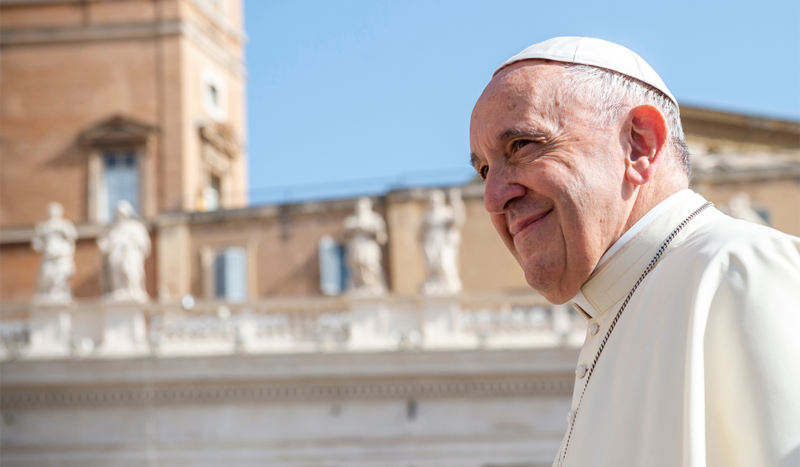
AM113 / Shutterstock.com
On Sunday, October 6, during the Angelus prayer, Pope Francis announced the creation of 21 new cardinals for the Catholic Church. This will bring the College of Cardinals to 256 members, 141 of whom will be eligible to vote in a papal conclave—a record-breaking number, surpassing the traditional limit of 120 electors.
Of these 141 electors, 111 (79%) were appointed by Pope Francis.
In line with his previous nine consistories, the Pope has selected a blend of cardinals from prominent, historically cardinal-led dioceses like Toronto (Canada), Lima (Peru), Santiago de Chile, and Turin (Italy). However, he has also extended the red hat to leaders from what he calls the “peripheries”—regions less traditionally represented in the College of Cardinals. This includes appointments from places such as Tehran (Iran), Algiers (Algeria), Tokyo (Japan), Bogor (Indonesia), and Kalookan (Philippines).
Additionally, the Pope has named several Vatican officials to the College, including two priests and one monsignor, all known to be close to him personally.
In the days leading up to the announcement, there had been speculation that the Pope might appoint a new U.S. cardinal. Among the rumored candidates were Archbishop Richard G. Henning of Boston, a diocese typically associated with a cardinal, and Bishop Mark Seitz of El Paso, Texas, a vocal advocate for immigrants. However, no U.S. cardinals were named.
The Pope also bestowed the title of honorary cardinal on Archbishop Angelo Acerbi, a former apostolic nuncio, who, at 99, is not eligible to participate in a conclave.
The newly appointed cardinals will be officially elevated during a consistory on December 8, the Solemnity of the Immaculate Conception.
The new cardinals
Archbishop Frank Leo, metropolitan archbishop of Toronto (Canada)
Archbishop Tarcisius Isao Kikuchi, S.V.D., metropolitan archbishop of Tokyo (Japan)
Archbishop Dominique Joseph Mathieu, O.F.M. Conv., archbishop of Tehran-Ispahan (Belgian missionary bishop in Iran)
Archbishop Carlos Castillo Mattasoglio, metropolitan archbishop of Lima (Peru)
Archbishop Vicente Bokalic Iglic, archbishop of Santiago del Estero, one of the poorest dioceses in Argentina, recently elevated by Pope Francis as the primate diocese in the country.
Archbishop Luis Gerardo Cabrera Herrera, O.F.M., metropolitan archbishop of Guayaquil (Ecuador)
Archbishop Fernando Natalio Chomali Garib, metropolitan archbishop of Santiago de Chile (Chile)
Archbishop Laszlo Nemet, S.V.D., metropolitan archbishop of Belgrade (Serbia)
Archbishop Jaime Spengler, O.F.M., metropolitan archbishop of Porto Alegre (Brazil,) President of the Latin American Bishops Council (CELAM)
Archbishop Ignace Bessi Dogbo, metropolitan archbishop of Abidjian (Ivory Coast)
Archbishop Jean-Paul Vesco, O.P., metropolitan archbishop of Algiers (Algeria)
Archbishop Roberto Repole, metropolitan archbishop of Turin (Italy)
Archbishop Rolandas Makrickas, coadjutor archpriest of the Basilica of St. Mary Major in Rome (Lithuania)
Bishop Baldassare Reina, until Sunday Auxiliary of the diocese of Rome, but announced as new Vicar during the Pope’s Angelus of the diocese of Rome (Italy)
Bishop Paskalis Bruno Syukur, O.F.M., bishop of Bogor (Indonesia)
Bishop Pablo Virgilio Siongco David, bishop of Kalookan (Philippines)
Monsignor George Jacob Koovakad, official of the Secretariat of State and organizer of papal trips (India)
Father Fabio Baggio, C.S., undersecretary for the Migrants and Refugees Section of the Dicastery for the Promotion of Integral Human Development (Italy)
Father Timothy Radcliffe, O.P., former Master of the Dominicans (United Kingdom)
Archbishop Angelo Acerbi, former apostolic nuncio to the Netherlands.

